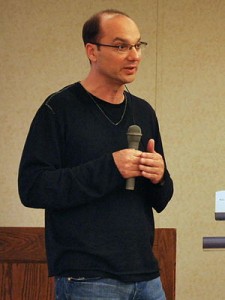Andy Rubin, head of Android at Google, is leaving that job to take on another unspecified role at the company in a surprise management switch up

Google CEO Larry Page announced in a blog post today. Sundar Pichai, head of Chrome and Apps, is now in charge of Android.
Rubin, who joined Google in 2005 and was tasked with turning Android into a mobile operating system to rival Apple‘s iOS, is credited with helping to turn the mobile OS market into a two-horse race. With help from more than
60 partners, including Samsung, Android has become the top mobile OS used on smartphones sold in the U.S., according to comScore. Google says more than 750 million devices have been activated globally with the software and 25 billion apps have now been downloaded from Google Play.
“Pretty extraordinary progress for a decade’s work,” Page said today. “Having exceeded even the crazy ambitious goals we dreamed of for Android—and with a really strong leadership team in place—Andy’s decided it’s time to hand over the reins and start a new chapter at Google. Andy, more moonshots please!”
Android now comes under the supervision of Pichai, who joined Google in 2004 and has been overseeing the company’s other operating system — Chrome. This may be a sign that the two OSes may become closer as the company moves foward in its challenge to Apple’s iOS, used to power the iPhone and iPad, and OS X, the software used in Mac computers. Google last month introduced its latest Chromebook, a thin notebook called the Pixel.
Pichai, an avid chess player, turned down the job to serve as head of product for Twitter in 2011 after Google reportedly gave him $50 million in stock grants to stay.
“It’s a natural progression of Android,” said Carolina Milanesi, lead Google analyst at Gartner Inc. “It signals the shift away from the platform per se and to building applications and an ecoystem. Rubin has done what he was supposed to – he’s built a strong platform and created momentum. Now we have a point where the platform is mature and it needs to evolve, with the focus on the applications and the ecosystem and the synergy with Chrome and Chromebooks and Android.”
Google’s tablets, smartphones and Chromebooks all need to work together and developers need to know they can build applications across the company’s ecosystem, which is why the handoff ot Pichai makes sense, Milanesi added. “Rubin has allowed the user base to be there. Now it’s time for the company to take advantage of the installed base and monetize it.”




